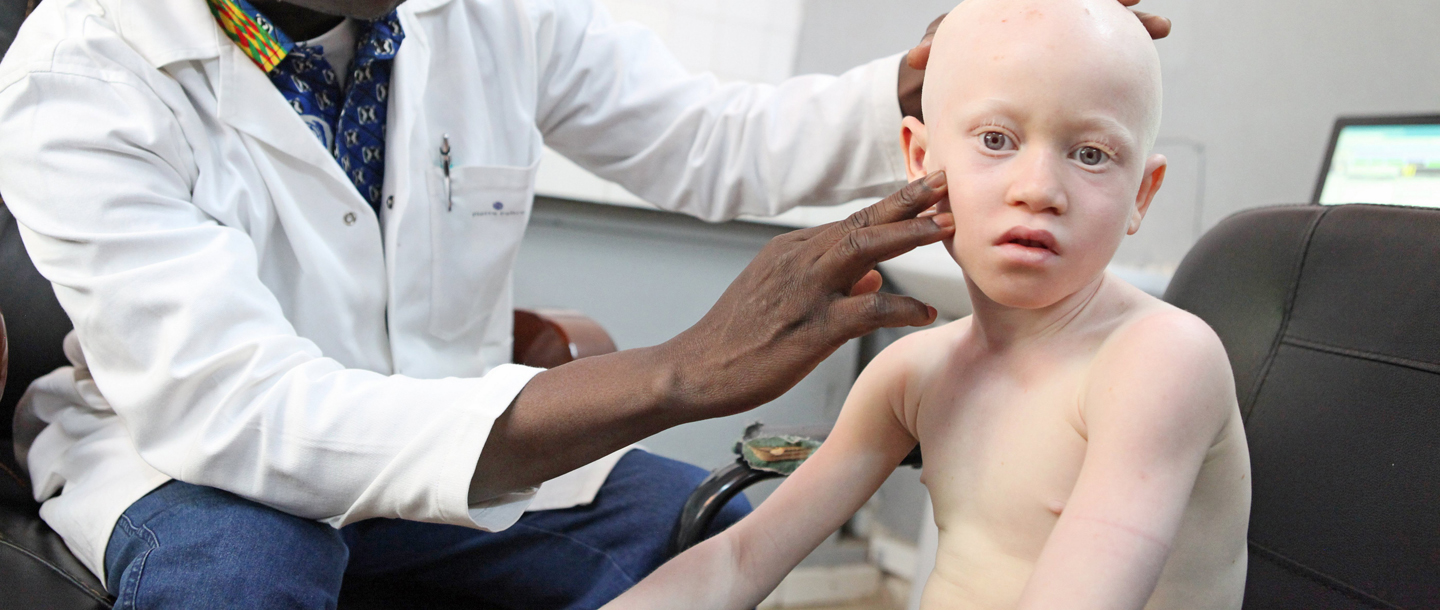Preventing skin cancers due to albinism
— Mali —

BACKGROUND
Since 2015, the Fondation Pierre Fabre has extended its initiatives to targeted dermatology programmes in the tropics. These conditions, which may seem to be common or benign pathologies, are nonetheless stigmatising, potentially serious diseases when left untreated. On the African continent, where the number of dermatologists is largely insufficient (15 per 15 million inhabitants in Mali, two per 18 million in Niger, for example*), the public healthcare needs are very great. Skin diseases are very common in developing countries, making dermatology one of the four main reasons for medical visits to primary health centres.
The Fondation Pierre Fabre has been alerted to the seriousness and extent of albinism-related health problems in Africa by various associations. This genetic disease, characterised by a lack of pigmentation of the skin, hair and eyes, causes extreme sensitivity to sun exposure. The risks of developing skin cancer and skin disorders are extremely high and studies suggest that most people with albinism die from skin cancer between the ages of 30 and 40 (report by I. Ero, independent expert for the United Nations, 2015).
In sub-Saharan Africa, this genetic condition is four to five times more prevalent than in the rest of the world (in part linked to endogamy), with an occurrence of up to one case per 1,500 people in certain regions. The lack of information on the connection between albinism and skin cancer only exacerbates this situation. Still, these dramatic consequences are, to a great degree, preventable: simple means, such as using sunscreen and wearing appropriate clothing, can prevent these cancers.
Lastly, people with albinism experience major challenges in integration due to ancient beliefs assigning them supposedly magical powers. In some countries, including Tanzania, superstitions lead to mutilation, dismemberment, organ harvesting and murder. Since 2007, various organisations have reported hundreds of assaults linked to witchcraft beliefs and practices in more than 25 countries.
In late 2015, the Fondation Pierre Fabre put out a call for proposals to improve early detection, information and medical care for people with albinism. Among the two programme finalists, the Foundation has chosen to support the association Solidarité pour l’Insertion des Albinos au Mali (SIAM). For three years, the Foundation will collaborate with this association which, in conjunction with the Centre National d’Appui à la lutte contre la Maladie (CNAM), home to the dermatology department in Mali, has set the following objectives:
In late 2015, the Fondation Pierre Fabre put out a call for proposals to improve early detection, information and medical care for people with albinism. Among the two programme finalists, the Foundation has chosen to support the association Solidarité pour l’Insertion des Albinos au Mali (SIAM). The Foundation will collaborate with this association which, in conjunction with the Centre National d’Appui à la lutte contre la Maladie (CNAM), home to the dermatology department in Mali, has set the following objectives:
- Improving education and raising awareness among people with albinism by training 12 representatives: two representatives per target region in a total of six regions: Bamako, Sikasso, Kayes (Kita), Yélimané, Koulikoro and Ségou
- Prevention and management of cancer and precancerous conditions by CNAM dermatologists
- Producing and distributing a locally produced sunscreen cream
*Report by Professor Ousmane Faye, Department of Dermatology, CNAM, Bamako, Mali
KEY FACTS
_____
Priority
Dermatology
Programme
Since 2016
Type of involvement
Distributor
Actions
- Training dermatologists
- Supporting sunscreen production
- Skin cancer information and prevention
SIAM
Rue 415 – Niaréla
Bamako
Mali
The programme for treating skin cancer in people with albinime is of paramount importance. For people with albinism, skin cancer is the biggest health risk. Tumours usually develop in young people (aged 25 to 35) who have no access to medical care and are forced to withstand sun exposure as they strive to support themselves.
Lalla Aïcha Diakité
Preseident of the SIAM Association
ACHIEVEMENTS AND FUTURE INITIATIVES
Achievements
1,937
consultations carried out since the beginning of the project
12
representatives trained in 6 regions to improve education and raise awareness
6,555
jars of sunscreen cream produced by members of the association and distributed free of charge
Perspectives
The Fondation Pierre Fabre is duplicating this programme in other sub-Saharan African countries.
PARTNERS
- Association Solidarité pour l’Insertion des Albinos au Mali (SIAM)
- Centre National d’Appui à la lutte contre la Maladie (CNAM, ex-Institut Marchoux), Secrétariat Général du Ministère de la Santé
See also
Prevention and early management of skin cancer for people with albinism
Skin cancer is a major risk for albinos, but the number of dermatologists in Africa is far insufficient. The Foundation takes action.
21/09/2018See also
Creation of a national teledermatology service
Mali, faced with a regional dermatologist shortage, is assessing the feasibility of a telemedicine programme. Objectives: improve healthcare and create a true communications network.
31/07/2018Follow our actions
Twenty-five years ago, the Fondation Pierre Fabre was recognized as a public-interest foundation
This was an essential step for Pierre Fabre, who was personally involved in obtaining that status. This recognition provided the assurance of reliability and steadfast presence, and also authorized the receipt of grants, donations and bequests by virtue of its public-interest mission.





